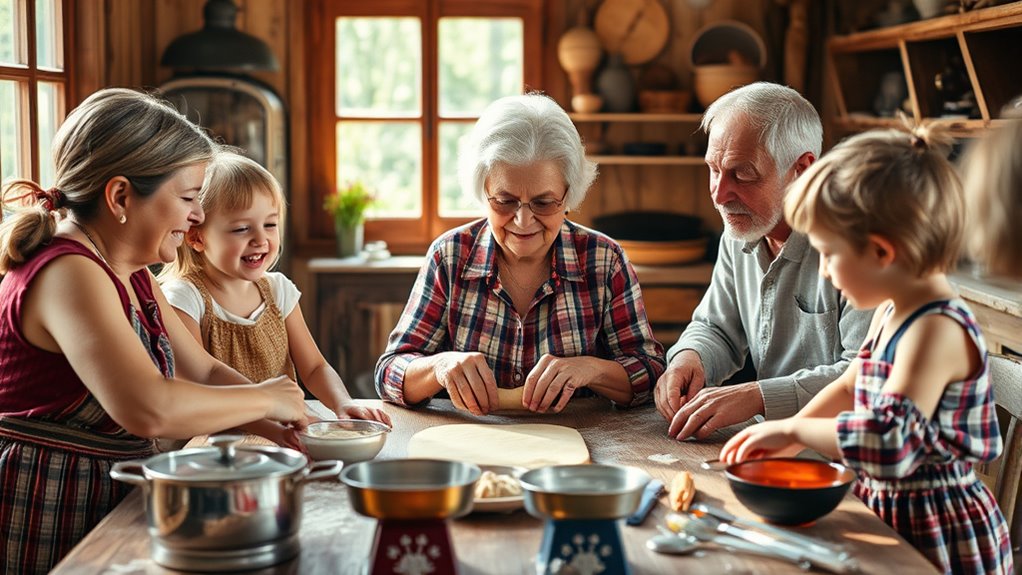Rituals play a vital role in strengthening family bonds by creating shared experiences, fostering emotional resilience, and providing a sense of stability. By establishing meaningful traditions, you connect across generations, reinforcing values and history. Incorporating rituals into daily life helps build closeness, even during busy times. When conflicts arise, rituals offer safe spaces for support and understanding. Want to discover more about how to make rituals work for your family? Keep exploring.
Key Takeaways
- Rituals reinforce cultural identity, fostering a sense of belonging and shared heritage among family members.
- Regular family routines create stability, emotional resilience, and a safe environment for open communication.
- Celebrating traditions and storytelling strengthen intergenerational bonds and transmit core values.
- Shared rituals during conflicts promote understanding, reconciliation, and emotional support.
- Adapting rituals to changing circumstances maintains relevance and deepens family connection over time.
The Psychological Impact of Family Rituals
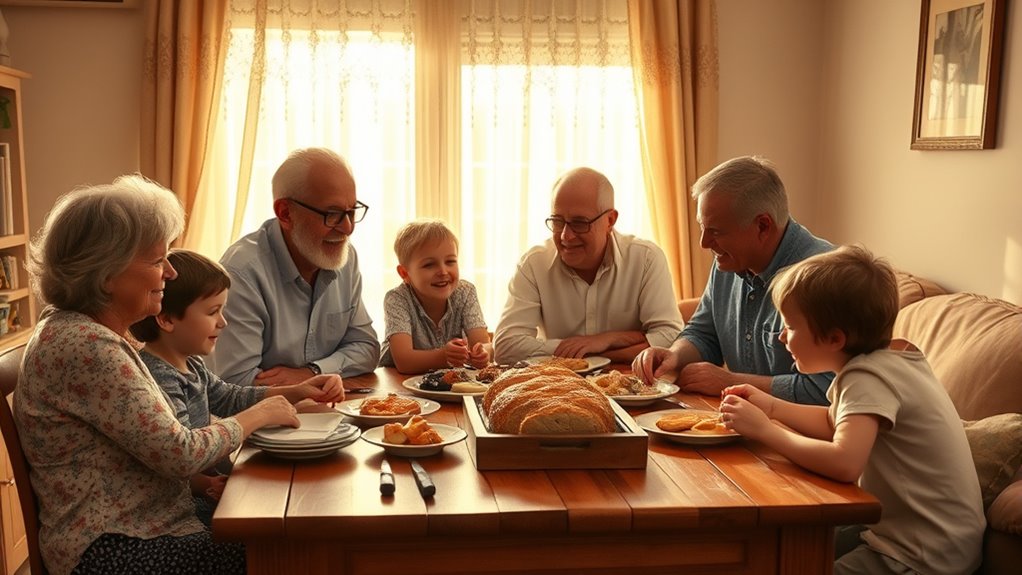
Family rituals hold more than just sentimental value; they also shape your psychological well-being. These routines carry cultural significance, linking you to your heritage and fostering a sense of identity. When you participate in regular rituals, you build emotional resilience, helping you cope with stress and challenges more effectively. Rituals provide stability, giving you a safe space to express emotions and strengthen your connection with loved ones. They serve as anchors during difficult times, offering comfort and reassurance. By engaging in these shared activities, you reinforce positive memories and a sense of belonging. Over time, this emotional foundation boosts your confidence and mental health, making you more adaptable and resilient in facing life’s uncertainties. Incorporating family traditions into your routine can further deepen these benefits and promote long-term well-being. Recognizing the importance of family dynamics can help you understand how these rituals influence your personal growth and relational strength. Additionally, engaging in routines that include healthy habits can enhance your overall psychological resilience and physical health. Developing consistent family routines can also improve communication and trust within your household.
Creating Meaningful Traditions Across Generations

Creating meaningful traditions across generations requires intentional effort and shared purpose. You can foster connection by encouraging intergenerational storytelling, where family members share stories that reveal values and history. This bridges gaps and builds understanding. Incorporate cultural celebration practices that honor your heritage, such as festivals or special rituals, to reinforce identity and unity. To deepen these traditions, consider:
Foster family bonds through storytelling, cultural rituals, and shared traditions that honor your heritage and values.
- Documenting stories through albums or recordings
- Creating new rituals that reflect evolving family values
- Celebrating holidays with unique, meaningful customs
- Passing down recipes or crafts that carry cultural significance
Additionally, incorporating digital literacy programs can help seniors participate in these traditions through playful communication and technology use, which is essential in modern family dynamics. Recognizing the importance of intergenerational communication can further strengthen family bonds and ensure traditions are preserved for future generations.
Incorporating Rituals Into Daily Life Amid Busy Schedules
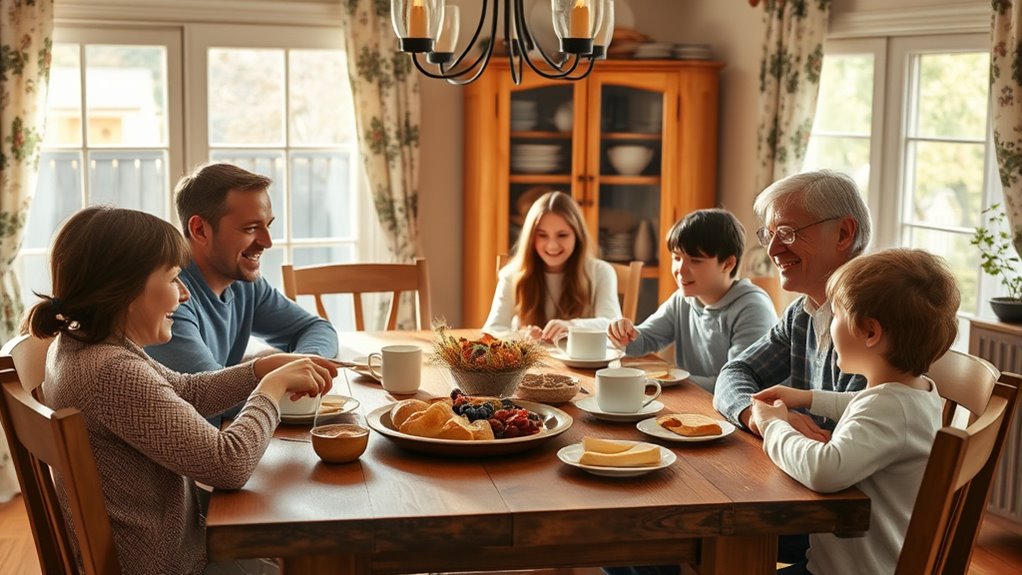
Even with hectic schedules, integrating meaningful rituals into daily life is possible and can strengthen family bonds. Simple routines like mealtime rituals create a dedicated space for connection amid busy days. Setting aside time to share a meal together encourages conversation and shared experiences. Bedtime stories are another effective way to foster closeness, providing a calming *changeover* from a hectic day to restful sleep. Keep these rituals consistent, even if they’re brief; regularity reinforces their importance. You can also adapt them to fit your schedule, such as quick stories or casual chats during meals. These small, intentional acts help nurture your family’s emotional ties and create a sense of stability, making even the busiest days meaningful through shared moments. Incorporating consistent routines can also improve overall family cohesion and create lasting memories. Establishing family traditions further enhances this sense of unity and belonging within the household.
Rituals as Tools for Conflict Resolution and Emotional Support
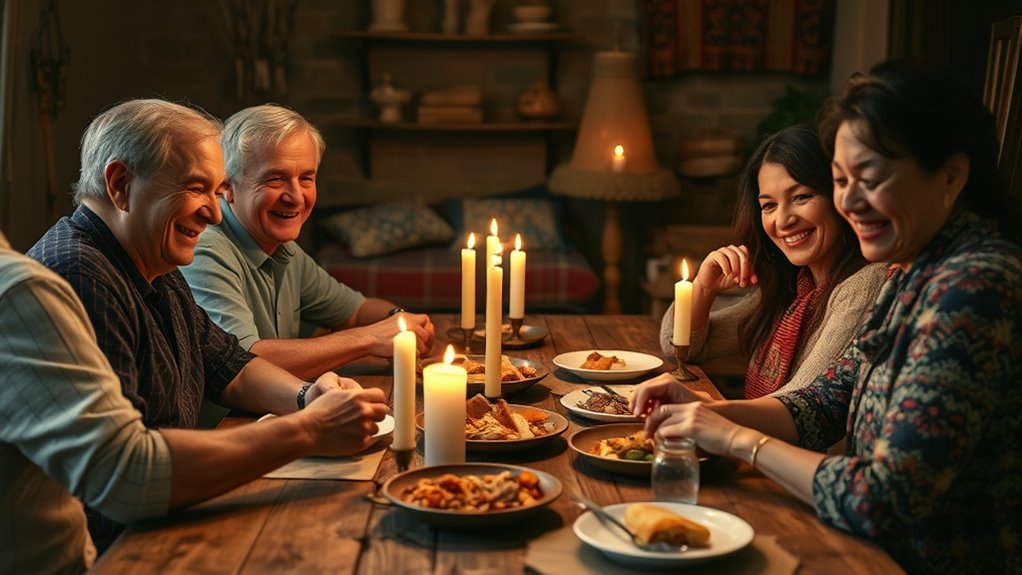
Rituals can serve as powerful tools for resolving conflicts and providing emotional support within the family. They create safe spaces where feelings can be expressed and understood. Celebration customs, like shared meals or special traditions, help reinforce bonds during difficult times. Incorporating nutrient-rich ingredients into family routines can also promote shared healthy habits and foster a sense of collective well-being. Communication rituals, such as regular family meetings or check-ins, foster open dialogue and mutual understanding. These rituals remind you that you’re part of a supportive network, especially when tensions run high. By engaging in consistent practices, you build trust and emotional resilience. Consider incorporating calming routines or shared activities during conflicts to de-escalate tension. These intentional rituals serve as anchors, helping family members feel heard, valued, and connected amid challenges. Incorporating family bonding rituals can further strengthen these bonds by making family traditions more engaging and meaningful.
Adapting Family Practices to Reflect Changing Circumstances
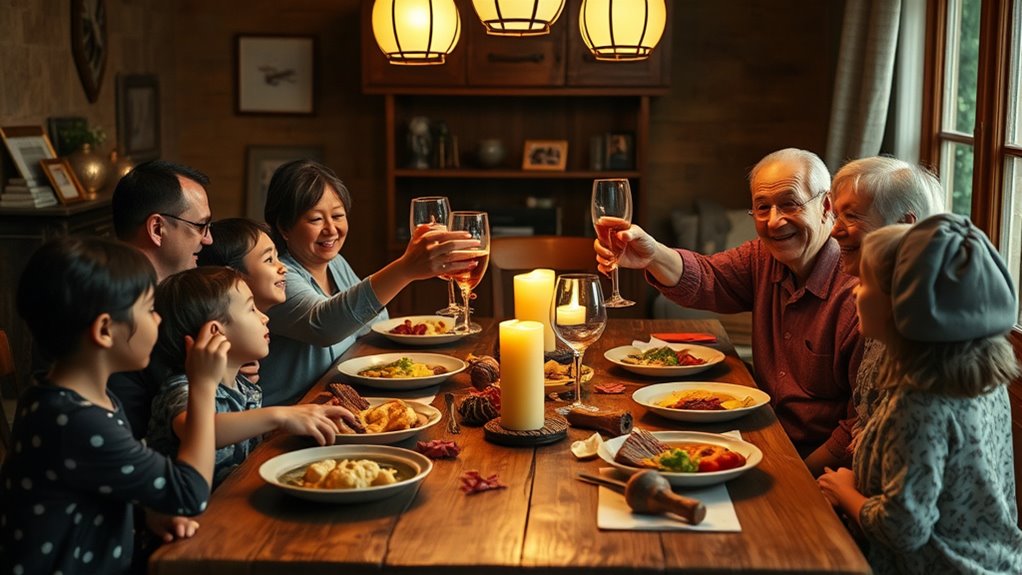
As families face new challenges and shifting circumstances, it’s important to adapt existing practices to stay connected and supportive. Cultural adaptations allow you to modify rituals to fit changing traditions or beliefs, guaranteeing they remain meaningful. This might mean blending old and new customs or incorporating elements that reflect your current values. Seasonal celebrations provide natural opportunities to reimagine family traditions, making them more inclusive or relevant. For example, you can adjust holiday activities to suit different schedules or circumstances, keeping the spirit alive despite obstacles. By being flexible and open-minded, you create a sense of continuity and belonging, reinforcing family bonds even as your environment evolves. Incorporating essential oils into family practices can also enhance emotional well-being and create calming rituals that strengthen connections. Additionally, understanding the benefits of organic and natural juices can inspire families to share healthy, mindful experiences together, fostering a sense of nurturing and care. For instance, selecting fresh and well-preserved lemon juice can contribute to healthier routines and shared moments. Embracing sustainable living practices in daily routines can further reinforce family values and promote environmental consciousness. Adapting practices ensures your rituals remain a source of comfort and connection.
Frequently Asked Questions
How Do Rituals Influence Family Members’ Long-Term Mental Health?
Rituals markedly influence your long-term mental health by boosting emotional resilience and reducing stress. When you participate in regular family rituals, you create a sense of stability and connection that helps you cope with life’s challenges. These shared routines foster a supportive environment, making it easier to manage stress and build emotional strength over time. Ultimately, rituals help you develop healthier mental habits and stronger family bonds, benefiting your overall well-being.
What Are Some Unconventional Rituals That Strengthen Family Bonds?
You can create unique celebrations or explore creative traditions that resonate with your family to strengthen bonds. These unconventional rituals might include themed movie nights, annual family storytelling sessions, or collaborative art projects. By engaging in these activities regularly, you foster a sense of togetherness and shared purpose. Embracing your family’s individuality through creative traditions helps build lasting memories and deepens your connection over time.
How Can Families Create Rituals That Include Extended Relatives?
Think of family rituals as a woven tapestry, with each thread representing a loved one. To include extended relatives, you can create family traditions that invite everyone—like virtual dinners, holiday stories, or collaborative projects. Plan extended celebrations that bring everyone together, whether in person or online. These shared experiences strengthen bonds, making the tapestry richer and more resilient, connecting generations through meaningful, inclusive rituals.
What Role Do Cultural Differences Play in Family Rituals?
You see, cultural diversity greatly influences family rituals, shaping how traditions are practiced and understood. Different cultures bring unique perspectives, resulting in variation in how families celebrate, observe, or honor their customs. You might notice that tradition variation creates rich, meaningful experiences, fostering deeper connections among family members. By embracing these differences, you strengthen your family bonds and promote mutual respect, enriching your shared identity through diverse cultural expressions.
How Can Families Measure the Impact of Their Rituals on Relationships?
Think of your family as a garden; you need feedback mechanisms to see what’s thriving. To measure the impact of rituals, observe changes in communication, connection, and support over time. Keep rituals consistent, like watering plants regularly, and ask family members for honest feedback. When you notice stronger bonds and more open sharing, you’ll see your rituals’ positive influence bloom, proving their essential role in nurturing your family’s roots.
Conclusion
So, next time you skip family dinner or forget that special holiday tradition, remember—you’re not just breaking the routine, you’re sabotaging your emotional support system. Who needs therapy when you can argue over who forgot to call grandma? Embrace rituals, or risk turning your family into a collection of strangers with matching last names. After all, nothing says “I love you” like a well-timed family game night—preferably with snacks.
